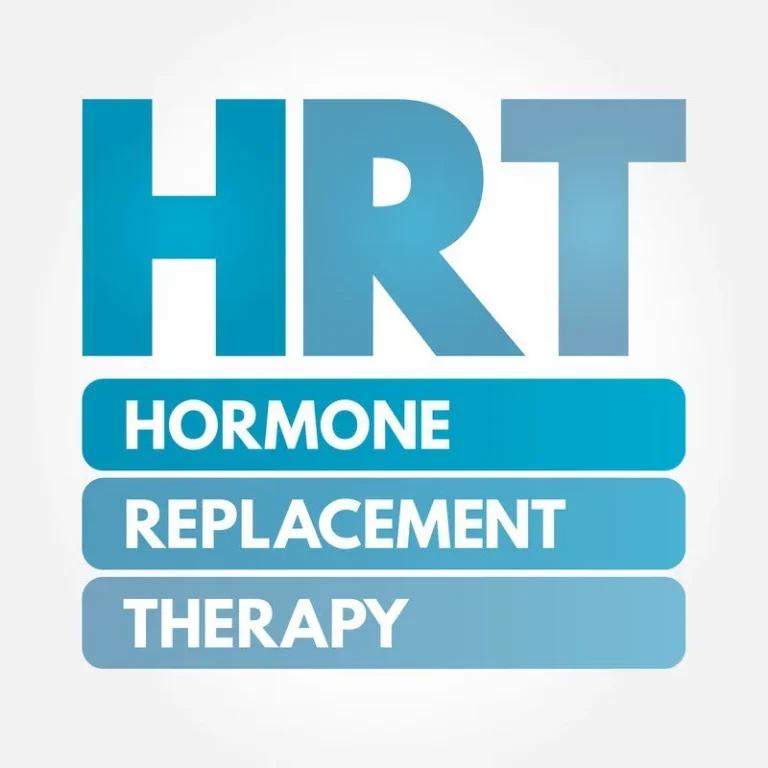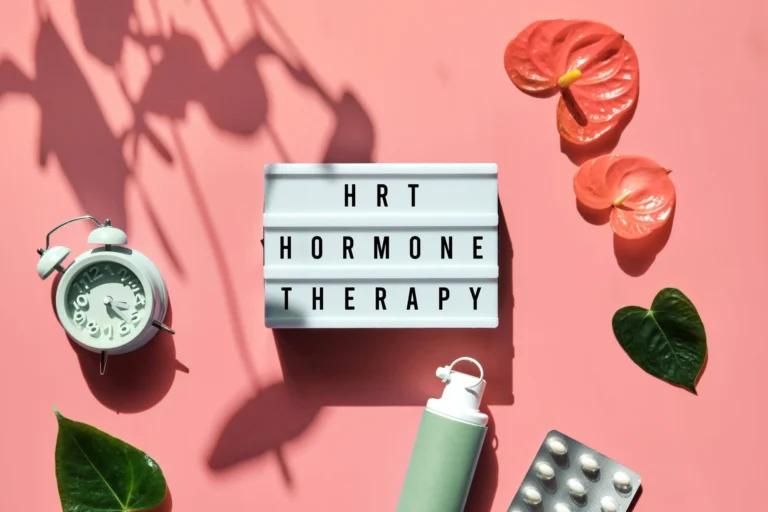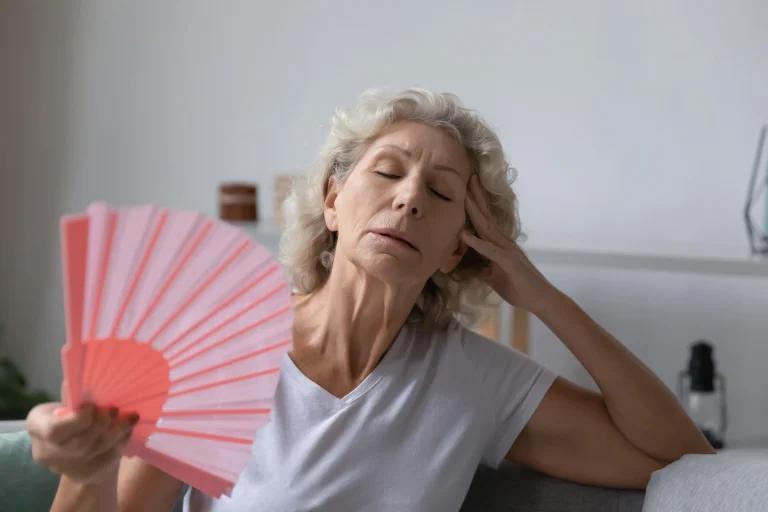

October 15, 2025 (Current Version)
September 17, 2025
March 28, 2025
As we age, our bodies undergo various changes, including hormonal shifts. Women, in particular experience significant hormonal imbalances during menopause. Hormone replacement therapy (HRT), also known as menopausal hormone therapy is a medical treatment designed to alleviate menopause symptoms by boosting hormone levels. However, despite its proven benefits, HRT remains a controversial topic. In this blog post, we’ll explore the ins and outs of HRT, including its benefits, risks and what to expect during treatment.
What is Hormone Replacement Therapy?
HRT is a medical treatment that involves supplementing or replacing the hormones that the ovaries naturally produce, but decrease during menopause. This hormonal decline can lead to various menopausal symptoms.
What is the menopause?
As women approach their late 40s and early 50s, they may experience a natural transition known as menopause. Menopause is the point in a woman’s life when she no longer ovulates and experiences a decline in the production of certain hormones, such as estrogen and progesterone. This can cause a range of physical and emotional changes, which are typically categorised into three stages:
- The first stage, known as perimenopause, also known as the transition phase can last several years and involves irregular periods, hot flashes and mood swings
- The second stage, menopause, is marked by the absence of menstrual periods for 12 months straight
- Finally, postmenopause is the period after menopause, when symptoms may diminish but other health concerns may arise, such as an increased risk of osteoporosis or heart disease
Symptoms of menopause
Menopause is a natural transition that occurs in a woman’s life when she stops menstruating. Symptoms of the menopause vary from woman to woman.
Vasomotor symptoms
One of the most common symptoms is vasomotor symptoms, including hot flashes (hot flushes) or night sweats. Hot flashes can be exceptionally bothersome as they can last anywhere from a few seconds to several minutes and can be accompanied by flushing, sweating and chills. Night sweats may also lead to difficulty sleeping.
Musculoskeletal symptoms
Musculoskeletal symptoms such as joint and muscle pain can also be challenging, making it harder to stay active and maintain a healthy lifestyle.
Effects on mood
Mood changes including low mood or irritability may also occur and impact daily life.
Urogenital symptoms
Urogenital symptoms such as vaginal dryness and discomfort can make intercourse difficult or painful, leading to a loss of sexual desire that can be distressing to both partners.
All these symptoms can have a significant impact on a woman’s overall quality of life. Despite these symptoms, menopause does not have to be a negative experience, with many women finding relief through lifestyle changes or medical interventions.
Types of HRT for menopause treatment
If you’re considering hormone replacement therapy (HRT), it’s important to know that there are different types available:
- For women who still have their womb, combined HRT that includes both oestrogen and progestogen can be prescribed. This type of HRT involves taking both oestrogen and progestogen hormones to alleviate symptoms like hot flashes, mood swings and vaginal dryness. Progestogen is added to the treatment to protect the uterus against the risk of endometrial cancer or uterine cancer and ovarian cancer, which can be a potential risk when taking only oestrogen
- Women who have had their womb removed in a hysterectomy can opt for oestrogen-only HRT. This type of HRT replaces the oestrogen that the body no longer produces after the removal of the uterus. Oestrogen plays an important role in bone density, heart health and overall wellbeing
Both options can help alleviate symptoms of menopause like hot flashes, mood changes and vaginal dryness. However, it’s essential to discuss with your healthcare provider which type of HRT would be appropriate for your individual needs and health history.
There are different forms of HRT, each with its benefits and considerations:
- Tablets are one of the most common forms of HRT and are usually taken once a day
- Patches can be applied to the skin to deliver a consistent dose of hormones throughout the day
- Gels and creams can be applied topically and absorbed into the skin
- Vaginal rings are inserted into the vagina for localised relief
It’s important to discuss with your healthcare provider which form of HRT is best for you based on your symptoms and health history.
Benefits of HRT
HRT, or hormone replacement therapy, can offer a plethora of benefits for women’s health. Not only can it help manage symptoms of menopause such as hot flashes and mood swings, but it can also have a positive impact on bone density. With age, many women experience a decrease in bone density which can result in osteoporosis, a condition that weakens bones and makes them more prone to fractures. HRT has been shown to reduce the risk of osteoporosis in postmenopausal women, ultimately preventing fractures and improving overall bone health. Furthermore, studies have suggested that HRT can also decrease the risk of colorectal cancer, further highlighting the potential benefits of this treatment. Consult with your doctor to determine if HRT is right for you and to discuss any potential risks.
Risks of HRT
Hormone replacement therapy (HRT) can be effective, but it also comes with potential risks:
Increased breast cancer risk
One of the main concerns is an increased risk of breast cancer. Studies have shown that women who take the combination of estrogen therapy and progestin, commonly used in HRT, are more likely to develop breast cancer than women who do not take it. While studies have shown that HRT may increase the risk of breast cancer, the actual risk is small and varies depending on factors such as age and length of use.
Increased risk of heart disease, stroke and blood clots
Clinical trials have shown that HRT can increase the risk of blood clots (thrombosis), stroke and heart attack in some women. This is because the hormones in the treatment can cause changes in blood clotting factors, cholesterol levels and blood pressure, which can increase the likelihood of these serious conditions. The risk appears to be higher for older women and women who smoke. The exact mechanism behind this increased risk is not fully understood, but it is believed that the hormones in HRT may promote the formation of blood clots or contribute to the thickening of arteries. Women who are considering HRT should discuss the potential risks and benefits with their healthcare provider and make an informed decision based on their individual health history and circumstances.
It’s important to talk to a healthcare provider about the potential risks and benefits of HRT before starting the treatment. The risk of developing these health conditions varies depending on a woman’s age, medical history and type of HRT treatment she receives. This is why it’s essential to discuss the potential risks and benefits of HRT with your doctor. They can help determine if it is the right option for you and provide guidance on how to minimise any risks associated with the treatment.
What to Expect During Hormone Replacement Therapy
Every woman’s experience with HRT will differ. However, it’s worth noting that most women will notice a significant improvement in their menopause symptoms, within a few weeks of starting HRT. The length of HRT treatment and dosage will depend on the severity of a woman’s symptoms and medical history.
While every person’s body is unique and will respond differently, there are some possible side effects that you should be aware of. These can include headaches, fluid retention, breast tenderness, mood changes and spotting or bleeding. It’s important to note that not everyone who undergoes HRT treatment will experience these side effects and they may vary in severity and duration. Low-dose regimens may lower the risk of serious adverse effects and health risks. Women are also advised to keep their doctor updated on any side effects they might experience during HRT treatment.
What is Hormone Replacement Therapy for males?
Hormone replacement therapy (HRT) is becoming increasingly common for men who have low levels of testosterone. This treatment is designed to provide the body with the necessary hormones it needs to function correctly. HRT can help alleviate symptoms such as fatigue, difficulty concentrating, decreased muscle mass and decreased sex drive. It is essential to talk to a healthcare professional before starting any new treatments to determine if HRT is the right option for you. They will take into consideration your medical history and current symptoms to determine if HRT is the best course of action. With the right guidance and support, HRT can be a highly beneficial treatment option for men experiencing low levels of testosterone.
Can hormone replacement therapy cause postmenopausal bleeding?
It’s a common question among women who have undergone HRT. While postmenopausal bleeding is a potential side effect of HRT, it’s essential to consult your doctor to evaluate the underlying cause and make an informed decision about the right treatment for you. You should always see your doctor if you have any abnormal vaginal bleeding which develops after starting HRT.
How does hormone replacement therapy work for transgender people?
If you are a transgender person, you may have heard of hormone replacement therapy (HRT) as a way to help you feel more in line with your true gender identity. But you may be wondering, how does it work?
Essentially, HRT involves taking hormones that align with the gender you identify as. For example, if you are a transgender woman, you would take estrogen and possibly a testosterone blocker. This can help promote physical changes that are more aligned with your gender, such as breast development, smoother skin and decreased body hair.
On the other hand, if you are a transgender man, you would take testosterone, which can promote facial hair growth and a deeper voice, among other changes. While HRT may not be right for everyone, it can be an important step for those seeking to feel more comfortable in their skin.
Is Hormone Replacement Therapy expensive?
From April 1st 2023 if you pay for NHS-prescribed HRT medicines 3 or more times in 12 months, a HRT Prepayment Certificate (PPC) could save you money.
Each item on an NHS prescription usually costs £9.65. You can buy an HRT PPC for a one-off payment of £19.30 (the cost of two single items). The HRT PPC covers an unlimited number of certain HRT medicines for 12 months, regardless of why they are prescribed. The HRT PPC does not cover all HRT medicines. Speak to your pharmacist for more information.
Recent statistics released by the Department of Health reveal that 15% of women between the ages of 45-64 living in England are using Hormone Replacement Therapy (HRT). Luckily, new projections suggest that lowering the cost of HRT treatment could positively impact over 400,000 women who are experiencing the uncomfortable symptoms that accompany menopause, such as hot flushes and vaginal dryness.
Explore treatment options with a healthcare professional
Hormone replacement therapy can be an effective treatment for menopause symptoms. However, it’s essential to discuss HRT with a medical professional and have a thorough understanding of the potential risks and benefits associated with the treatment. Menopause is a natural part of ageing; every woman experiences it differently. If you’re experiencing menopause symptoms, don’t hesitate to seek medical help. Your doctor can help you explore various treatment options and determine what the best course of action is for you.
Sources
- Hormone replacement therapy (HRT) – NHS
- Menopause – NICE
- NHS Hormone Replacement Therapy Prescription Prepayment Certificate (HRT PPC) – NHS
- The Menopause – Women’s Health Concern
- HRT – Women’s Health Concern
Medical Disclaimer
NowPatient has taken all reasonable steps to ensure that all material is factually accurate, complete, and current. However, the knowledge and experience of a qualified healthcare professional should always be sought after instead of using the information on this page. Before taking any drug, you should always speak to your doctor or another qualified healthcare provider.
The information provided here about medications is subject to change and is not meant to include all uses, precautions, warnings, directions, drug interactions, allergic reactions, or negative effects. The absence of warnings or other information for a particular medication does not imply that the medication or medication combination is appropriate for all patients or for all possible purposes.







